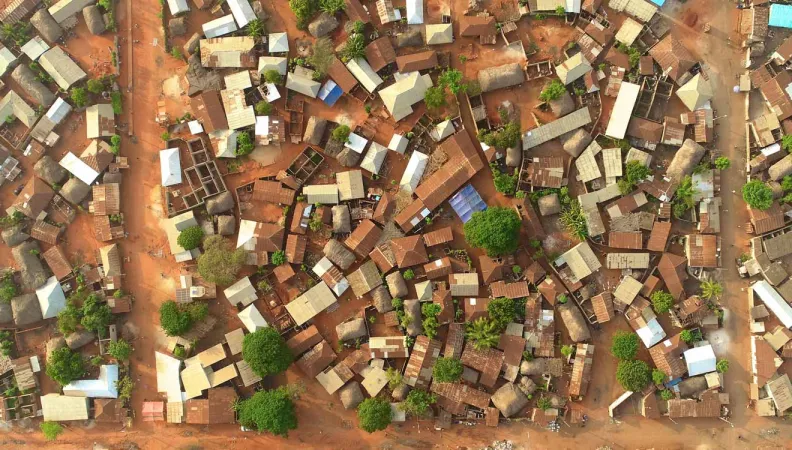Share the page
The Sustainable Housing Initiative (Shi) to Promote Access to Affordable Homes

AFD has launched the Sustainable Housing Initiative (SHI) to support access to decent housing. This multi-country facility aims to support the implementation of affordable and sustainable housing policies through technical assistance for public entities in charge of housing at the national and local levels.
The accelerated urbanization of the late 20th and early 21st centuries in developing and emerging countries, has given rise to urban fragmentation, the deterioration of living conditions for many city-dwellers and growing inequalities in access to decent housing. Housing is now all the more crucial for sustainable cities, and is inextricably linked to the achievement of Sustainable Development Goals (SDGs).
Quality housing supply suited to local needs, and located near areas of employment and essential services can help to address problems of inequality and exclusion. The improvement of buildings’ carbon footprints throughout their entire life cycle also significantly contributes to climate change mitigation and adaptation, given that this sector accounts for 40% of global greenhouse gas emissions (WEO, 2019).
The housing supply shortage currently amounts to 330 million residential units worldwide (WRI, 2017). Combined with accelerated urbanization, this housing shortage has led to the development of informal settlements, deteriorated living conditions, and an increase in artificial land cover and soil pollution. This often means insecure tenure, construction in high-risk areas, inadequate housing and higher cost of urban utilities.
While many countries have set ambitious targets for housing supply, few programs have managed to secure sufficient funding and are actually implemented. As a matter of fact, public housing policies often require additional preparation support for sustainable regulatory and financial frameworks to be developed, to unlock funds and to achieve successful implementation.
Incomplete public policies and regulatory frameworks can hinder the development of a comprehensive and efficient affordable housing industry. Existing support programs often show little consideration for inclusive and sustainable urban development.
It is against this background that AFD launched the Sustainable Housing Initiative (SHI) in 2021, with the following objectives:
- Provide housing stakeholders with the expertise they need to perform a targeted diagnosis aimed at strengthening their public policies
- Define operational levers for action to develop a work program that will unlock the capacity to produce a diversified and qualitative housing supply.
In particular, it is a matter of developing access to affordable housing and integrating the challenges of adaptation to climate change. The SHI is also committed to strengthening sectoral dialogue between public, private and community stakeholders, and to advocating sustainable housing as a stimulus for overall development.
The Sustainable Housing Initiative (SHI) offers solutions adapted to the beneficiary countries or cities. These beneficiaries are located in the countries where AFD operates and may include local authorities, public or private affordable housing providers or the States themselves.
By providing technical assistance and conducting sectoral studies on housing and capacity-building measures, the SHI aims to accomplish the following:
- Contribute to the implementation of regulatory and financial frameworks that enable the financing of climate change resilient, low-carbon and environmentally friendly housing construction and renovation.
- Support national and local decision-makers in the formulation of housing policies that will develop the production of diverse, quality housing solutions, such as the:
- Formulation of financing schemes adapted to the needs of the population.
- Inclusion of low-income, vulnerable populations, women, students and low-paid workers.
- Formulation of regulations and standards suited to the local context in terms of urban planning, land management and bioclimatic construction standards.
- Preparation of housing projects and programs with a significant leverage effect.
- Development of environmental and social risk management tools (incorporating property and involuntary resettlement challenges).
- Promote the integration of environmental issues in housing policies including:
- Research into architectural design and sustainable forms of housing and management of land resources.
- Urban planning promoting green and blue corridors and better integration of biodiversity in cities.
- Use of nature-based solutions, such as planning that promotes re-vegetation that respects local ecosystems.
- Promotion of energy efficiency in buildings, the structuring of local building material industries, and support for sustainably managed bio-sourced materials.
- Strengthen political and strategic sectoral dialogue involving both the private and financial sectors, which should lead to dialogue with all stakeholders, including those that are often overlooked (employees, housing cooperatives and NGOs).
- Contribute to advocacy in favor of the housing sector as a lever for social and economic development.
- Encourage discussions and feedback between cities and countries.
To learn more about the application process, please contact your country's local AFD office or contact:
- SHI Coordinator: Julie Attlan
- SHI housing project Team Leader: Delphine Le Duff
